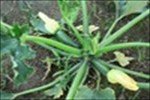
July 05, 2008
July brings hot summer weather. Now is the time to enjoy the crisp fresh veggies that you have worked so hard to grow.
- Enjoy harvesting.
This month you will be able to enjoy harvesting and eating your peas, beans, beets, lettuce, carrots, potatoes, kale, leeks, Swiss chard, broccoli, and zucchini.When harvesting:
- Use a clean sharp knife when cutting off fruit.
- Hold on to the plant with one hand while gently pulling peas or beans with the other so as not to damage the plant.
- Cut outer leaves of leafy greens so the center can grow to extend your harvest.
- For new potatoes dig around the base of the plant with your hand and pull out a few small potatoes. More will produce and grow if the plant is not pulled out.
- Clean up your debris so as not to attract pest and disease.
- Keep watering, weeding and fertilizing your garden.
Be sure to keep your vegetables watered throughout the season. Your garden needs 1 inch of water each week. Keep your garden weeded so your vegetables do not have to compete for nutrients from the soil. Make and use compost or manure tea to fertilize your veggies so they can keep producing great fruit for you to enjoy. - Mark certain vegetable you want to keep for saving seed.
Choose your best and healthiest looking plants for seed saving. Mark them with a tie or ribbon so you remember not to harvest the fruit or seeds. - Watch for signs of pests, insects and disease.
Take the time everyday to walk around your garden and observe our plants.Some things to watch for in the summer months are:
- Blossom drop is caused by extreme temperatures changes and can affect tomatoes, peppers, eggplants and squash. These plants usually react by not forming any fruit. if the temperature is going to get below 60 degrees or above 95 degrees protect your plants from the heat or cold.
- Virus disease can affect tomatoes, cucumbers and peppers. The plant leaves become mottled with yellow and green. They also become rough and have a leathery texture. The mottled areas turn brown and then the leaves die. The plants are stunted and bear little fruit. The plant continues to bloom normally but the fruit is often deformed and does not taste very good.
There are many different strains of virus and it is often difficult to determine where it came from. Tobacco mosaic virus is one of the most common viruses and is transmitted from cigarette smoke on a persons hand. Do not smoke in your vegetable garden. Viruses are usually spread by contaminated tools, insects and by your hands. If your plant is affected, pull it out, and destroy it. Take care not to spread the virus by placing the infected plant into a garbage bag immediately, place it int he garbage, clean the tools you used, and clean your hands before working in the garden again.
- Continue to succession sow and set out winter crops.
This month continue to sow lettuce, kale, Swiss chard, carrots, beets to harvest in the fall. Transplant out cauliflower, broccoli, cabbage and onions to harvest all winter. - Take time to relax.
My husband has composed and produced the most beautiful instrumental guitar music to relax to. This music is wonderful for listening to while taking a lovely soak in the bath, relaxing in the shade or enjoying a wonderful dinner that your harvested from our own garden.Sanctuary is a "must have" item in every gardener's tool kit. Enjoy the peaceful relaxing melodies.
VEGETABLE OF THE MONTH  Zucchini
Zucchini
Here are my tips for growing great zucchini:
- Zucchini comes in yellow or green varieties.
- it loves hot weather and produces all summer long.
- Zucchini plants have both male and female flowers. Both need to be out at the same time and bees are needed for pollination. The first flowers to bloom are the male flowers. They open on the end of a long stalk. One week later you will see the female flower. This flower blooms close to the plant on the end of a swollen stem that resembles a mini zucchini. When the female flower it successfully pollinated the stem swells forming the zucchini.
- When your fruit begins to form and then when it is 1 - 2 inches long it them rots your could have 2 different problems. The first it could be rotting because of dampness. As the plant grows some of the leaves get really large which can shade the center of the plant. Cut some of these large leaves so the sun can reach the center and so it does not stay too damp. The other problem could be the fruit is not being pollinated properly. It starts to grow them begins to shrivel and rot . There is not a lot you can do about this except encourage bees in your garden.
- Start harvesting when the fruit is finger size as they are very sweet when small. Zucchini can grow really quickly so harvest regularly.
Enjoy the wonderfully warm weather of July, make delicious meals with veggies from your garden and take time to relax by listening to the music on Sanctuary
Check in with www.your-vegetable-gardening-helper.com for the simplest steps to having your own vegetables.
If you have enjoyed this ezine please tell a friend.
Welcome to the world of vegetable gardening!
Catherine